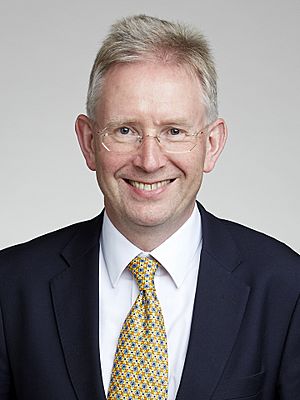Chris Abell facts for kids
Quick facts for kids
Chris Abell
FRS FRSC FMedSci
|
|
|---|---|

Abell in 2016
|
|
| Born |
Christopher Abell
11 November 1957 |
| Died | 26 October 2020 (aged 62) |
| Nationality | British |
| Education | University of Cambridge (BA, MA, PhD) |
| Known for | Astex biosynthesis as targets for the rational design of antimicrobials; fragment-based approaches to enzyme inhibition; and biological nanotechnology |
| Awards | Hickinbottom Award (1991) |
| Scientific career | |
| Fields | Biological chemistry |
| Institutions | University of Cambridge Brown University |
| Thesis | Polyketide biosynthesis (1982) |
| Doctoral advisor | James Staunton |
| Doctoral students | Shankar Balasubramanian Alessio Ciulli |
Christopher Abell (11 November 1957 – 26 October 2020) was a British biological chemist. He was a professor at the University of Cambridge. He taught biological chemistry in the Department of Chemistry. When he was chosen for the Royal Society in 2016, they said his work "changed the face of drug discovery." This means his research made a big difference in how new medicines are found.
Contents
Early Life and Education
Christopher Abell studied at St John's College, Cambridge. He earned a Bachelor of Arts degree in Natural Sciences in 1979. Later, in 1982, he completed his PhD. His PhD research focused on how polyketides are made naturally. His supervisor for this work was James Staunton.
Career and Research Focus
After his PhD, Abell worked at Brown University in the USA. He studied how terpenes are made in living things. In 1984, he joined the Department of Chemistry at the University of Cambridge. He became a Professor of Biological Chemistry in 2002. He also held important roles like Director of Postdoctoral Affairs. In 2016, he became Pro-Vice-Chancellor for Research. This meant he helped lead research efforts across the university.
Abell wrote over 200 scientific papers. His research looked at several exciting areas:
- He studied how vitamins and amino acids are made. He used this knowledge to design new antimicrobial medicines. These medicines fight against harmful germs.
- He explored "fragment-based approaches" to stop enzymes from working. This is a clever way to find new drugs.
- He researched riboswitches in bacteria and plants. Riboswitches are like tiny switches that control genes.
- He also worked on reactions in very small liquid drops.
- Another area was biological nanotechnology. This field uses tiny structures for scientific purposes.
Creating New Companies
Christopher Abell was also an entrepreneur. He helped start several companies that used his scientific discoveries:
- In 1999, he co-founded Astex Technology Ltd. This company uses a special method to find new drugs for cancer.
- In 2001, he helped start Akubio. This company made biosensors. These sensors could detect bacteria and viruses.
- In 2010, he co-founded Sphere Fluidics. This company develops technology using tiny liquid drops.
- In 2012, he co-founded Aqdot. This company works on a new way to put tiny capsules around substances.
Personal Life
In 1981, Christopher Abell married Katherine Abell. She also worked in the Department of Chemistry at Cambridge. They had one son. Christopher Abell passed away suddenly on October 26, 2020.
Awards and Recognition
Christopher Abell received many awards for his important work:
- In 1992, he won the Imperial Chemical Industries (ICI) Prize in Organic Chemistry.
- He also received the Hickinbottom Award from the Royal Society of Chemistry.
- He was given a Yamada Science Foundation Award.
- In 2012, he became a Fellow of the Academy of Medical Sciences (FMedSci).
- In 2016, he was elected a Fellow of the Royal Society (FRS). This is a very high honor for scientists in the UK.
 | Georgia Louise Harris Brown |
 | Julian Abele |
 | Norma Merrick Sklarek |
 | William Sidney Pittman |

